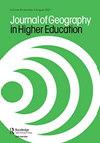The effect of emotional experiences in fieldwork: embodied evidence from a visual approach
IF 1
4区 教育学
Q2 EDUCATION & EDUCATIONAL RESEARCH
引用次数: 6
Abstract
ABSTRACT Emotion has become an important topic in fieldwork courses of higher geography education. This study attempts to provide embodied evidence of the important value of emotional experiences in fieldwork and clarify that the teaching effect produced by fieldwork in a real environment is difficult to achieve in a virtual environment. Using eye-tracking , this study captured the eye movement data of 16 fieldwork participants and 15 nonparticipants gazing upon photographs and analyzed how emotions affect their acquisition of geographic knowledge. The eye-tracking experiment showed that students who participated in fieldwork processed visual information more quickly and had stronger emotional responses than those who did not participate. This article proposes that fieldwork can provide students the opportunity to encounter the environment in a “mind-body-environment” system, thereby constructing the following two different forms of geographic knowledge: characterizable and explicit knowledge and nonrepresentational, implicit, and embodied knowledge. The latter can be realized only via emotional experiences in the field. Therefore, this article claims that although the information age enables students to acquire remote knowledge of geographical environments through multiple channels, training qualified geographers remains inseparable from fieldwork, especially for cultivating cognition, emotions and responsibility for the “living” world..情感体验在田野调查中的作用:来自视觉方法的具体证据
情感已成为高等地理野外考察课程的重要内容。本研究试图为情感体验在实地考察中的重要价值提供具体证据,并阐明在真实环境中实地考察所产生的教学效果在虚拟环境中难以实现。本研究采用眼动追踪技术,采集了16名实地考察参与者和15名非实地考察参与者注视照片时的眼动数据,分析了情绪如何影响他们对地理知识的获取。眼球追踪实验表明,参加实地考察的学生比没有参加实地考察的学生处理视觉信息的速度更快,情绪反应也更强烈。本文提出实地考察可以为学生提供在“身心环境”系统中接触环境的机会,从而构建以下两种不同形式的地理知识:可表征的显性知识和非表征的隐性知识。后者只能通过实地的情感体验来实现。因此,本文认为,尽管信息时代使学生能够通过多种渠道获得地理环境的远程知识,但培养合格的地理学家仍然离不开实地考察,尤其是培养对“生活”世界的认知、情感和责任感。
本文章由计算机程序翻译,如有差异,请以英文原文为准。
求助全文
约1分钟内获得全文
求助全文
来源期刊

Journal of Geography in Higher Education
Multiple-
CiteScore
5.80
自引率
9.50%
发文量
29
期刊介绍:
The Journal of Geography in Higher Education ( JGHE) was founded upon the conviction that the development of learning and teaching was vitally important to higher education. It is committed to promote, enhance and share geography learning and teaching in all institutions of higher education throughout the world, and provides a forum for geographers and others, regardless of their specialisms, to discuss common educational interests, to present the results of educational research, and to advocate new ideas.
 求助内容:
求助内容: 应助结果提醒方式:
应助结果提醒方式:


